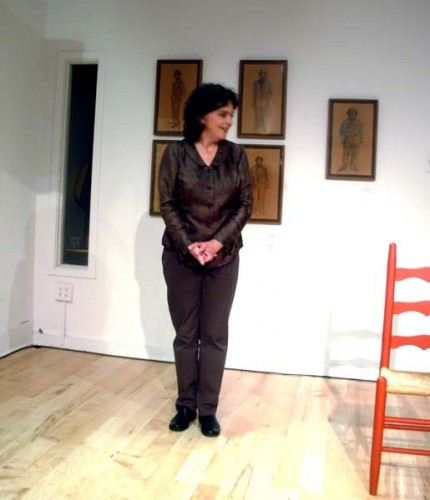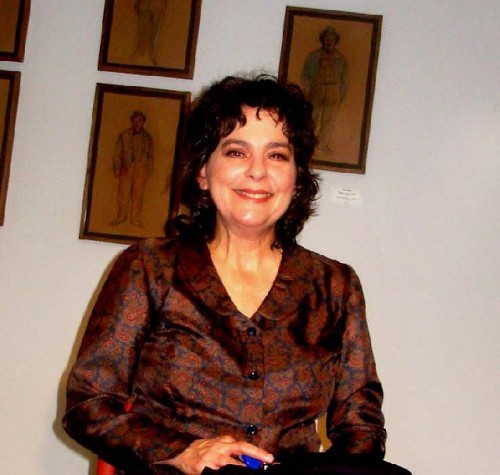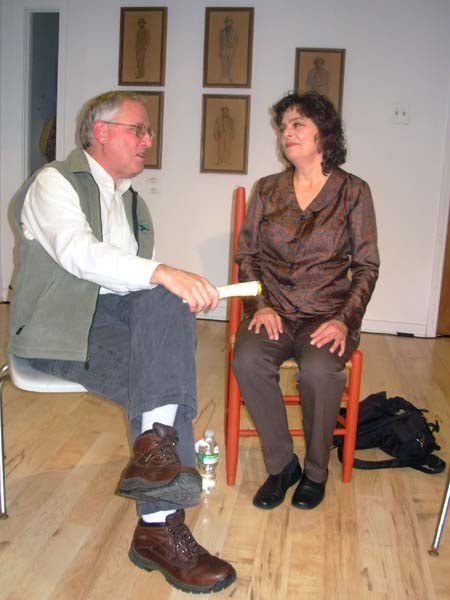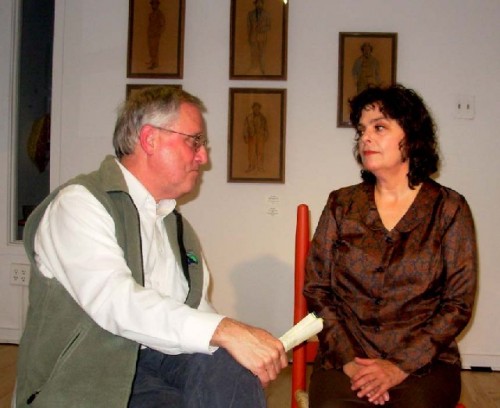Anne Galjour You Can't Get There From Here
One Woman Performance at MCLA's Gallery 51
By: Charles Giuliano - Nov 11, 2008
There is much to admire in the game performance of Anne Galjour in the one woman play "You Can't Get There From Here." The work had its premiere recently at Dartmouth College and was presented last night at Gallery 51 of the Massachusetts College of Liberal Arts in North Adams.
On an otherwise slow Monday evening the gallery was packed with students and theatre lovers. In making opening remarks, Jonathan Secor, representing MCLA, welcomed back Galjour who previously performed "Hurricane" at the college. He pointed out the special exhibition that surrounded us "Beyond the Curtain: Theatrical Designs Berkshires to Broadway" curated by the designer Brian McDevitt, a Berkshire resident.. It was an appropriate ambiance for an evening of theatre.
"Normally our special events take place at the Church Street Center" Secor said "But we like to spread these performances around the campus; particularly an intimate work such as this." On December 3, Songs of the Spirit, a Multicultural Feast for the Soul, will be featured at the Church Street Center.
Intimate is the right term to describe Galjour's performance. Seated in the front row I could have reached out and touched her. Indeed, she often made direct eye contact. Perhaps I was a more receptive face than the apathetic student, next to me, who fidgeted, fanned herself with a program, and yawned at regular intervals. The point is that if you are going to behave so badly don't sit in the front row.
Particularly when an actress is putting her heart and soul into a performance as was the case in this appearance. She clearly has guts getting up there with no stage or platform to elevate her above eye level. The only prop was a rush seated, painted chair. She used it effectively, at times, sprawling on it offering us a back view evoking an odalisque on a divan. At other times she moved it about, or circled it, all while evoking a dozen rural New England characters, male and female, with appropriate vocal nuances. There were occasional sound effects from a speaker set on a stand. It was operated by an associate manning a laptop computer with a cue sheet.
The title of the new, commissioned work "You Can't Get There From Here" was unfortunately apt. It was difficult to follow the thread of the narrative about the tragic events of individuals facing poverty and adversity in what appeared to be backwater, hard scrabble Maine. There was a focus on a down on his luck eccentric living in a trailer and raising rabbits for food and fur. His dog occasionally ravishes the garden of a long suffering neighbor. Whose daughter is scrounging for beer cans to redeem for cash in order to have a birthday celebration with friends at Chucky Cheese. Her quest for cans takes her into fearful contact with the scruffy old codger and his smelly habitat with all those festering pelts and carcasses.
While Galjour's delivery was flat and often harsh, with a working class New England accent, it was surprising to learn that she is native Cajun from Louisiana and has lived and worked in San Francisco for the past 24 years.
Although we were attentive to the performance it was easy to get lost in the forest, literally, trying to follow all the twists of the plot and narrative. It seems that the work was intended to have a didactic point. It was commissioned for Dartmouth College's Class Divide. It entailed considerable research in which Galjour became embedded with families including sharing meals and their stories. These were woven together, as she states, through "dialogues with the community about class and economic inequality in our country. I chose to do story circles to get to know folks. I participated in a series of story circles with senior citizens, high school seniors, residents of low income housing, church groups, students, and service employees. I also met with and interviewed local farming families and did a lot of walking in the woods. In the circles I learned rural New Englanders have a lot in common with rural Cajuns." Following the performance there was a discussion between Galjour, MCLA professor, Maynard Seider, and Valerie Schwartz the director of the Berkshire Food Project.
While this performance has strong educational benefits the evening felt too raw. It is best to approach it as a workshop of a play in progress. Certainly it would benefit from staging and proper lighting. The characters need to be more sharply defined. It is not enough to lower your voice to indicate a male character. The women in the narrative tended to blur and only the frightened girl was clearly delineated. Without these definitions the story line gets muddled and we come to wonder why, with all of the lively, rural detail, we really care about these people. The project must rise beyond sociology and oral history to exist as theatre. As always, the play's the thing.





